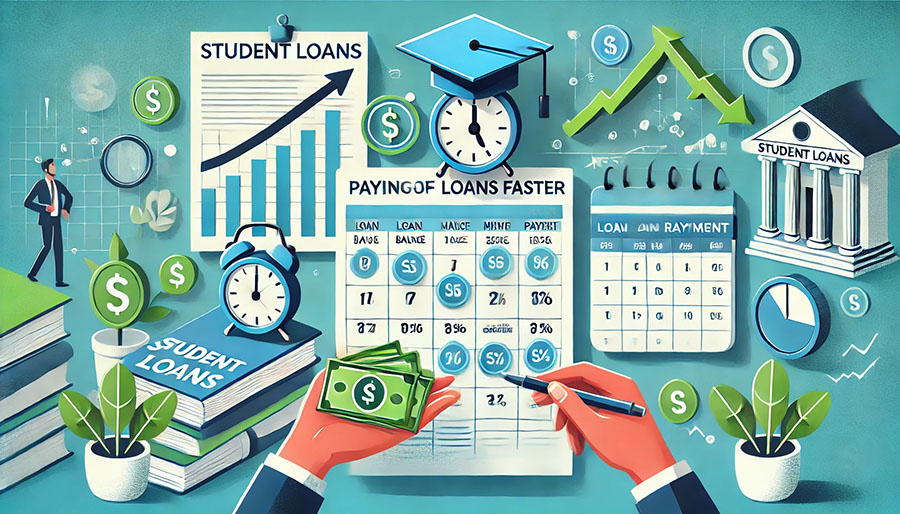Strategies for Paying Off Student Loans Faster

Strategies for Paying Off Student Loans Faster
Paying off student loans can be a long and sometimes overwhelming process, but with the right strategies, you can accelerate your progress and achieve financial freedom sooner. By adopting smarter repayment habits and leveraging available resources, you can reduce the overall interest you pay and become debt-free more quickly. Below are practical strategies for paying off student loans faster.
1. Make Extra Payments When Possible
One of the most effective ways to pay off student loans faster is to make extra payments whenever you can. This reduces the principal balance and the amount of interest that accrues over time. Even small extra payments can significantly shorten the loan term and save you money.
How to Do It:
- Biweekly Payments: Instead of paying your loan monthly, make half-payments every two weeks. This results in 26 half-payments or 13 full payments over the year, effectively making one extra payment annually without feeling a major financial strain.
- Lump-Sum Payments: If you receive a windfall like a tax refund, bonus, or gift, consider putting it toward your loan principal.
- Round-Up Payments: Each time you make a payment, round up to the nearest $50 or $100 to chip away at your balance faster.
2. Refinance Your Loans for a Lower Interest Rate
Refinancing student loans involves taking out a new loan to pay off your existing ones, ideally at a lower interest rate. A reduced interest rate can lead to lower monthly payments or allow you to pay the same amount each month but reduce the principal faster.
Consider Refinancing If:
- You have a strong credit score and stable income.
- Interest rates have dropped since you took out your loans.
- You can comfortably afford the monthly payments.
- You don’t rely on federal loan benefits like income-driven repayment or loan forgiveness.
Important Notes:
- Refinancing federal student loans with a private lender will make you ineligible for federal loan protections, such as income-driven repayment plans or Public Service Loan Forgiveness (PSLF).
- Always shop around for the best rates and terms before choosing a lender.
3. Enroll in Autopay to Reduce Interest Rates
Many loan servicers offer an interest rate reduction (often 0.25%) if you enroll in automatic payments. This small discount can add up over the life of the loan and contribute to faster repayment.
Benefits of Autopay:
- Ensures you never miss a payment, avoiding late fees and additional interest.
- Helps you budget consistently since payments are deducted on the same date each month.
- May qualify you for lower interest rates, especially if you refinance with a private lender that rewards autopay enrollments.
4. Apply for Student Loan Forgiveness Programs
Some borrowers qualify for federal student loan forgiveness programs that can significantly reduce or eliminate their remaining balance. While not everyone is eligible, it’s worth exploring these options if you work in qualifying professions or sectors.
Common Forgiveness Programs:
- Public Service Loan Forgiveness (PSLF): Available to borrowers who work in public service jobs for at least 10 years while making qualifying payments.
- Teacher Loan Forgiveness: Teachers working in low-income schools may be eligible for forgiveness after five consecutive years of service.
- Income-Driven Repayment Forgiveness: If you are on an income-driven repayment (IDR) plan, your remaining loan balance may be forgiven after 20 or 25 years of qualifying payments, depending on the plan.
5. Pay More Than the Minimum
Whenever possible, pay more than the minimum required monthly payment. Even an additional $20 or $50 can help you reduce your loan balance faster. By paying extra, you’re directly attacking the principal, which means less interest will accrue over time.
Tip:
- When making extra payments, confirm with your loan servicer that the additional money should go toward the principal rather than future interest. This ensures the extra funds directly reduce the loan amount, rather than simply prepaying future interest.
6. Consider the Snowball or Avalanche Method
Using structured debt repayment strategies can help keep you on track toward eliminating your student loan debt. The two most common methods are the debt snowball and the debt avalanche.
Snowball Method:
- Focus on paying off the smallest loan first while making minimum payments on other loans.
- Once the smallest loan is paid off, move on to the next smallest loan, creating a “snowball” effect.
- This method provides quick wins, which can be motivating.
Avalanche Method:
- Prioritize loans with the highest interest rates while making minimum payments on others.
- This method saves more money over time, as you reduce the amount of interest you pay.
- Although it may take longer to see significant progress, the avalanche method is mathematically the most efficient.
7. Take Advantage of Employer Repayment Assistance
Many employers now offer student loan repayment assistance as part of their benefits packages. These programs allow employers to make direct payments to student loan servicers on behalf of employees, which can significantly reduce your debt burden.
What to Look For:
- Some companies offer monthly contributions toward your student loans, which can be a valuable perk.
- Employer assistance programs are often capped at certain amounts, but even small contributions help reduce your loan faster.
- Check if your company offers this benefit or if you can negotiate it as part of your employment package.
8. Explore Side Hustles or Additional Income Streams
Boosting your income can help you pay off student loans faster. Consider taking on a side hustle or freelance work to earn extra money specifically dedicated to loan repayment. Even a few hundred dollars a month can speed up the process.
Ideas for Extra Income:
- Freelance work in your area of expertise, such as writing, graphic design, or coding.
- Gig economy jobs like ridesharing, food delivery, or tutoring.
- Online platforms like Etsy, eBay, or Amazon for selling goods or crafts.
- Part-time job in retail, hospitality, or another industry you enjoy.
9. Stick to a Budget
A well-planned budget helps ensure that you’re allocating enough money each month toward student loan repayment. By tracking your spending, you’ll know exactly where your money is going and can make adjustments to pay off loans faster.
Budgeting Tips:
- Prioritize loan payments: Treat your loan payments as a non-negotiable expense in your budget, just like rent or utilities.
- Cut unnecessary expenses: Look for areas where you can reduce spending, such as dining out or entertainment, and direct those savings toward your loans.
- Use budgeting apps: Digital tools like Mint, YNAB (You Need A Budget), or PocketGuard can help you stay on track with your financial goals.
10. Live Below Your Means
Living below your means may involve cutting back on lifestyle expenses or making sacrifices in the short term, but it’s an effective way to allocate more funds toward paying off student loans. By keeping your cost of living low, you can use the extra savings to make higher loan payments.
How to Live Below Your Means:
- Downsize your housing: Consider moving to a smaller apartment or less expensive area to save on rent.
- Limit discretionary spending: Avoid impulse purchases and focus on needs rather than wants.
- Avoid lifestyle inflation: As your income grows, try to resist increasing your spending accordingly. Instead, direct that extra income toward your student loan balance.
Conclusion
Paying off student loans faster is a goal that requires dedication, strategy, and smart financial planning. Whether through extra payments, refinancing, or taking advantage of loan forgiveness programs, you can speed up the repayment process and save on interest. The key is to stay disciplined, take advantage of opportunities, and keep your end goal of financial freedom in sight. By implementing these strategies, you’ll be on your way to paying off your student loans more quickly and moving toward a debt-free future.




